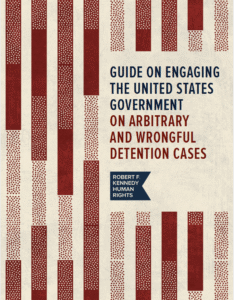Read the full Western Sahara Human Rights report here
(December 2, 2015 | Washington, D.C.) Moroccan authorities continue perpetrating serious abuses against the Sahrawi people in the non-self-governing territory of Western Sahara—including revelations of historic mass graves, torture, and multiple and assorted violations of human rights—according to Robert F. Kennedy Human Rights’ biannual report on violations that took place from July to December 2015.
Failure to counter recurring charges of serious human rights abuses underscores the need for a system of independent human rights monitoring in the Western Sahara, the Washington, D.C.-based human rights group concluded. Yet the United Nations Mission for the Referendum in Western Sahara (MINURSO) is still plagued by the absence of a human rights monitoring mandate, the U.N. Office of the High Commissioner for Human Rights has not published reports on activities or otherwise fulfilled a meaningful monitoring role during this reporting period, and a trip to the area by the U.N. Secretary-General, originally scheduled before the end of 2015, has not yet occurred.
In the wake of these failures to act, the most recent Robert F. Kennedy Human Rights’ biannual report, based on limited, but credible available reports during this period, revealed the following:
- The discovery of three historic mass graves, including the remains of at least 70 Sahrawi persons.
- At least 10 incidents of abuse in detention and/or violations of prisoners’ rights to health. Among these incidents was the death of Sahrawi political prisoner Bareeka Elomari, who died due to inadequate medical care in detention while serving a two-year sentence in the Ait Melloul Prison. Sahrawi prisoner Boubakr Arkoun also died after fainting in his cell in Tiznit Prison less than four months before his expected release.
- At least 19 incidents of arbitrary arrests and due process violations, and 19 incidents of violations of the rights of freedom of expression, assembly and/or association. Security forces continued violently dispersing peaceful protests. On one occasion in El-Aaiun, Moroccan authorities injured at least 20 Sahrawi peaceful protesters during a dispersal.
- At least seven incidents of unjustified restrictions upon freedom of movement and one injury due to a landmine blast.
Reporting on human rights violations in Western Sahara is significantly limited by severe constraints on the right to movement, severe restrictions on the press, and the Moroccan government’s repression of Sahrawi human rights defenders, journalists, and non-governmental organizations.
“International actors have shamefully failed to respond to the consistent allegations of significant human rights abuses perpetrated by Moroccan authorities in Western Sahara,” declared Kerry Kennedy, president of Robert F. Kennedy Human Rights. “Reports of torture in detention facilities, flagrant due process violations, and violent dispersals of peaceful protests in Western Sahara cannot continue to be left uninvestigated and unresolved.”
“The abuses reported against the Sahrawi people constitute violations of international human rights law,” observed David McKean, Robert F. Kennedy Human Rights program officer. “As the de facto occupying power, Morocco must guarantee the rights of the Sahrawi people enshrined in the International Covenant on Civil and Political Rights, the International Covenant on Economic, Social, and Cultural Rights, and the Convention against Torture. Its failure to do so for so long makes establishing an independent human rights monitoring mechanism in the territory essential.”




